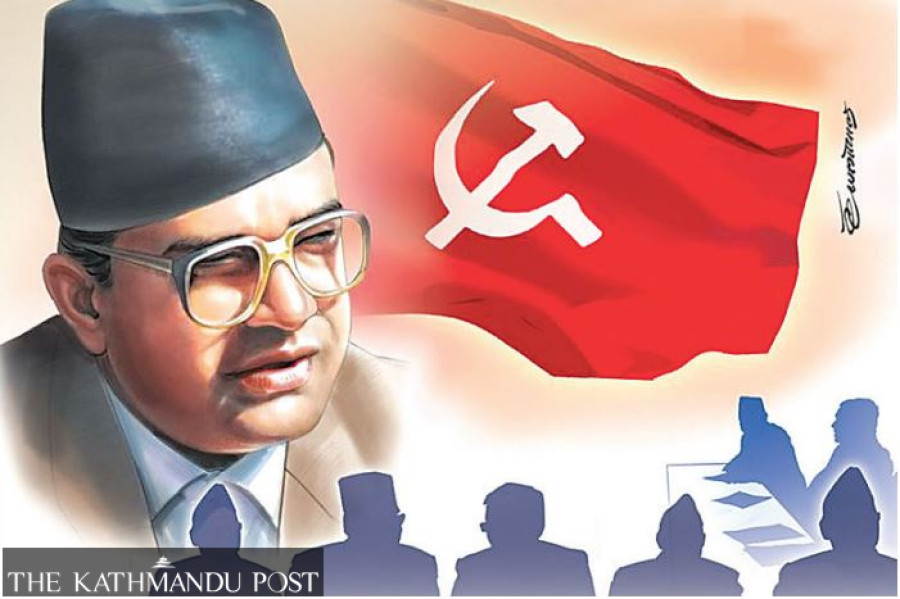Politics
The ideology debates in CPN-UML and CPN (Unified Socialist)
The newly formed party wonders if it could abandon People’s Multiparty Democracy, as its relevance is being questioned in the mother party.
Tika R Pradhan
After months-long struggle with KP Sharma Oli, Madhav Kumar Nepal last month made a decision. He gathered his fellow comrades and formed a new party.
The party’s initially proposed name was CPN (UML Socialist), but later the Nepal group, which broke off from the CPN-UML, registered CPN (Unified Socialist), as the Election Commission said the earlier name was too similar with the mother party.
In three days, the CPN (Unified Socialist) will be one month old.
The party had initially declared to take a departure from People’s Multiparty Democracy, or PMD, a political line that UML has followed since 1993, but on Thursday, Nepal said that PMD would be incorporated in the political line of CPN (Unified Socialist).
“We want to incorporate People’s Multi-party Democracy,” said Nepal, while speaking at a function organised by the Youth Association affiliated to his party. “We want to move ahead safeguarding the spirit and values of People’s Multi-party Democracy.”
Most of the leaders, including Ram Kumari Jhakri, the newly elected party secretary, however, have been proposing that PMD should remain the CPN (Unified Socialist)’s political line.
When Nepal’s first communist party was formed around seven decades ago, the basic idea was to launch a struggle against feudalism, autocracy, comprador capitalism and imperialism. But in the early 1990s, the late Madan Bhandari, a CPN-UML leader, worked on developing an extension to Marxism-Leninism and proposed an ideological line, which he dubbed People’s Multiparty Democracy. The thought abandoned the traditional revolutionary idea in support of a democratic multiparty system. This line was adopted in 1993. Just three years before, democracy had been restored in Nepal.
Bhandari proposed the idea as the new path of Nepal’s revolution, aiming
a mass-based party guided by a clear Marxist outlook, organisational principles, and discipline. The UML has followed the line almost for three decades now.
Many, however, now wonder how Madhav Nepal’s CPN (Unified Socialist) would be different from the CPN-UML.
“I don't think there will be any fundamental difference between the two parties–the mother party and the splinter group,” said Jhalak Subedi, who has closely followed Nepal’s communist movement.
Nepali communist parties, which are known for hyperboles, more often than not lay a lot of stress on their political ideologies unlike any other parties, like the Nepali Congress. For those having a keen interest in Nepal’s communist movement, these parties’ discourses can be both engrossing and exhausting.
Observers say Nepal’s communist parties have historically engaged in extensive discussions and debates on ideologies and they organise training programmes for cadres on their political lines, which are helpful during elections also.
When the UML was earlier split in 1998 when Bamdev Gautam decided to form the CPN-ML, the splinter party failed to come up with any new political line. It was a different party but it continued with its mother party’s PMD as its guiding principle. In the elections held next year in 1999, the CPN-ML failed to win even one seat, leading to its merger with the UML.
The debate on the political line in the CPN (Unified Socialist) is taking place at a time when the UML itself is seeing some voices if the PMD needs some modifications. The old guards like KP Oli and Ishwar Pokhrel, however, are for continuing with the PMD.
Ghanashyam Bhusal, known as one of the leaders most well-versed on PMD, has presented a written proposal demanding discussions on PMD. Bhusal is one of the 10 UML leaders who were with Madhav Nepal, struggling against Oli. These 10 leaders, however, decided to remain in the UML when Nepal formed a new party.
“I have presented my proposal,” said Bhusal. “Let’s see how the party leaders will take it at the Central Committee meeting which will begin from Friday.”
According to Bhusal, PMD was conceptualised by Bhandari at a time when the party believed Nepal was still a semi-feudal, semi-colonial country. He believes PMD’s chapter has been closed as the country has moved forward and it is no longer a semi-feudal, semi-colonial country.
Some political analysts say Nepali communist parties for long have debated their ideological issues, but they are mostly gobbledygook and full of jargons and they are incomprehensible to many.
“People’s Multiparty Democracy was nothing but a pretext for the communists to join multi-party democracy,” said Lokraj Baral, a professor of political science. “They just play with the communist jargons to deceive voters but in essence they have nothing different.”
Ideologies should be limited to running the parties, he said. “Parties need to address people’s concerns like social justice and they should have a plan for proper development of the country.”
Beduram Bhusal, the newly elected general secretary of the CPN (Unified Socialist), is one of the communist leaders to stick closely to party ideology. Bhusal holds a PhD on People’s Multiparty Democracy, focusing on the idea behind PMD, how Marxism has been used in Nepal and how PMD is an extension of Marxism-Leninism.
He is a firm believer that a party needs a clear ideology that not only shapes the party but also guides the party in the right direction so as to achieve the desired goal.
“Even to survive we will have to adopt a distinct ideology that is different from the UML. To establish a firm foothold in Nepali politics, we need to be different–through our actions, words and of course ideology,” Bhusal told the Post. “Our party’s goal is socialism, as the name suggests. We will come up with a programme to achieve socialism by safeguarding achievements that have been made on the basis of PMD, which the UML is not going to do.”




 11.12°C Kathmandu
11.12°C Kathmandu















